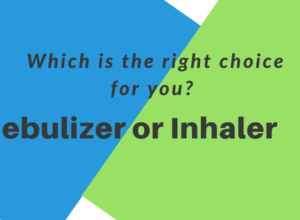Nebulizers or Inhalers can help fight respiratory infections or ailments that require medication for expedited relief. Once your therapist decides which medication is right for you, the next step is to choose the proper delivery method for that medicine. The two most common delivery methods are nebulizers and metered dose inhalers, also known as aerochambers. Choosing the best method of medication delivery can depend upon the type of ailment and requirement of the user.
Difference between Nebulizer and Inhaler
The need to deliver respiratory medication directly to the lungs is not reserved for the elderly or for young children alone. People of all ages can be affected by respiratory ailments, including allergies. Whether it’s a young child with bronchitis or croup, a teenager with asthma, or an adult suffering from emphysema, the need to rapidly administer medicine cannot be understated. While both nebulizers and inhalers deliver this medication directly to the lungs, there are benefits and disadvantages associated with each of them, so understanding how they affect the user is quite crucial. A common misconception is that nebulizer therapy is stronger than that of an inhaler or aerochamber. Albuterol is probably the most common medication used for respiratory ailments, and numerous studies have shown that patients receiving treatment with an inhaler do just as well as those with nebulizers.
So if both methods are effective, how do we determine which is right for your needs? In order to answer this question, it’s a matter of matching the user with the benefits of each delivery method.
Is a Nebulizer Right for You?
While an inhaler may be a great choice for those that can coordinate inhaling and dispensing their medication, the simplicity of a nebulizer is one way to overcome this shortcoming. Nebulizers can be electric or battery-powered. They turn liquid medication into a fine mist that penetrates deep into the lungs. The users don’t have to actively do anything to properly receive their asthma medication other than regular breathing. All that is required is to stay in one place. The user just has to put the mouthpiece or facemask on and just breathe. It is that easy.
Compact and portable compressor nebulizer systems come with all you need for your respiratory therapy needs. A portable nebulizer system can be extremely convenient for people who like to travel. A portable compressor nebulizer with a disposable nebulizer minimizes medication waste and increases patient compliance. Improper use of nebulizers can result in less medication getting directly into the lungs, increasing recovery time. Many electric nebulizers do need to be plugged into a wall outlet in order to function, but some battery-powered nebulizers are completely portable. These portable nebulizers allow you to take asthma medication on the go.
Is an Inhaler Right Choice for you?
To use the inhaler, a user must press the device to dispense the medication and inhale at the same time. It requires little, but a significant amount of coordination between hand and mouth. Any error in timing can lead to improper dosing due to medicine not being inhaled into sufficient quantity into the lungs. One way to minimize the error while using an inhaler is through the use of a spacer or aerochamber. The spacer holds asthma medication, so the user doesn’t need to coordinate inhaling while discharging the medication. They can just inhale whenever they are ready, which maximizes the amount of medication that gets inhaled into the lungs. Since reducing the amount of drug deposition into the mouth is important, the aerochamber with flowsignal whistle can be used to reduce the coordination needed between canister activation and inhalation.
Benefits of inhalers over Nebulizers
One benefit of inhalers over a nebulizer is that they are much faster to use. If done correctly, one dosage from an inhaler with a spacer can take 30 seconds or less compared to a nebulizer, which can take up to 10 minutes. Another benefit is that inhalers have fewer side effects. For instance, albuterol from an inhaler increases the heart rate less than that of a nebulizer. Another upside of the inhaler is the savings. Aside from the cost of nebulizers and related supplies, the cost of a dose of nebulizer albuterol can be 4-5 times the cost of an inhaler. One of the greatest benefits of an inhaler is the fact that they are so convenient and portable. They can be carried in your pocket or your purse, whereas a nebulizer is significantly more bulky, and many require an AC cord and plug.
To strengthen the muscles, we need to train regularly in the gym. Similarly, our respiratory system requires strengthening and practice as well. The Inspiratory Muscle Trainer can be used to strengthen respiratory muscles and improve breathing. In order to improve muscles used during exhalation, the Positive Expiratory Pressure Device can help patients breathe more freely. Consulting a physical therapist can help make these decisions easier.
Benefits of Portable Oxygen Concentrators.

Dr. Haseena Hamdani, MBBS, DGO, PGD Endocrinology and Diabetes (USW) is a Gynaecologist, currently practicing in Gaborone, Botswana since the last 17 years. Prior to setting up this clinic she worked in India as well as in Zambia, as a Gynaecologist and Obstetrician and was also associated with an Infertility center. She is also an online tutor for the University of South Wales.













Leave a Reply